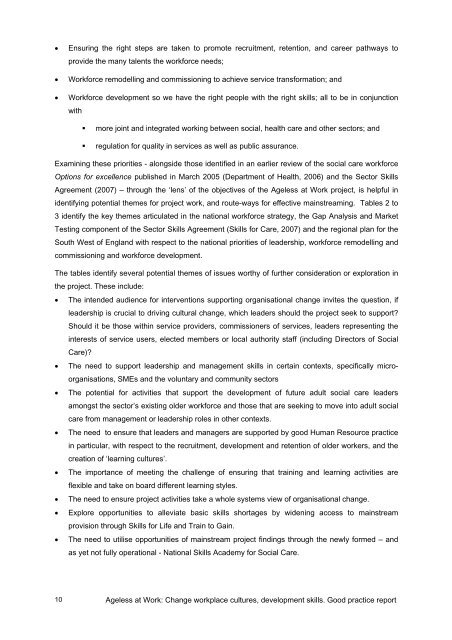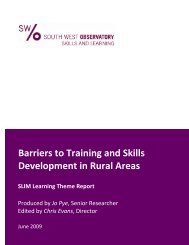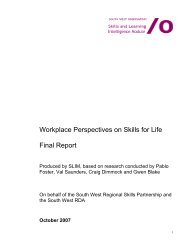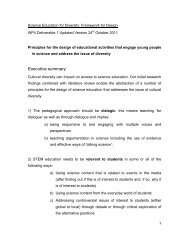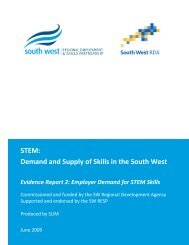Ageless at Work - Skills for Care
Ageless at Work - Skills for Care
Ageless at Work - Skills for Care
You also want an ePaper? Increase the reach of your titles
YUMPU automatically turns print PDFs into web optimized ePapers that Google loves.
Ensuring the right steps are taken to promote recruitment, retention, and career p<strong>at</strong>hways to<br />
provide the many talents the work<strong>for</strong>ce needs;<br />
<strong>Work</strong><strong>for</strong>ce remodelling and commissioning to achieve service trans<strong>for</strong>m<strong>at</strong>ion; and<br />
<strong>Work</strong><strong>for</strong>ce development so we have the right people with the right skills; all to be in conjunction<br />
with<br />
• more joint and integr<strong>at</strong>ed working between social, health care and other sectors; and<br />
• regul<strong>at</strong>ion <strong>for</strong> quality in services as well as public assurance.<br />
Examining these priorities - alongside those identified in an earlier review of the social care work<strong>for</strong>ce<br />
Options <strong>for</strong> excellence published in March 2005 (Department of Health, 2006) and the Sector <strong>Skills</strong><br />
Agreement (2007) – through the ‘lens’ of the objectives of the <strong>Ageless</strong> <strong>at</strong> <strong>Work</strong> project, is helpful in<br />
identifying potential themes <strong>for</strong> project work, and route-ways <strong>for</strong> effective mainstreaming. Tables 2 to<br />
3 identify the key themes articul<strong>at</strong>ed in the n<strong>at</strong>ional work<strong>for</strong>ce str<strong>at</strong>egy, the Gap Analysis and Market<br />
Testing component of the Sector <strong>Skills</strong> Agreement (<strong>Skills</strong> <strong>for</strong> <strong>Care</strong>, 2007) and the regional plan <strong>for</strong> the<br />
South West of England with respect to the n<strong>at</strong>ional priorities of leadership, work<strong>for</strong>ce remodelling and<br />
commissioning and work<strong>for</strong>ce development.<br />
The tables identify several potential themes of issues worthy of further consider<strong>at</strong>ion or explor<strong>at</strong>ion in<br />
the project. These include:<br />
The intended audience <strong>for</strong> interventions supporting organis<strong>at</strong>ional change invites the question, if<br />
leadership is crucial to driving cultural change, which leaders should the project seek to support?<br />
Should it be those within service providers, commissioners of services, leaders representing the<br />
interests of service users, elected members or local authority staff (including Directors of Social<br />
<strong>Care</strong>)?<br />
The need to support leadership and management skills in certain contexts, specifically microorganis<strong>at</strong>ions,<br />
SMEs and the voluntary and community sectors<br />
The potential <strong>for</strong> activities th<strong>at</strong> support the development of future adult social care leaders<br />
amongst the sector’s existing older work<strong>for</strong>ce and those th<strong>at</strong> are seeking to move into adult social<br />
care from management or leadership roles in other contexts.<br />
The need to ensure th<strong>at</strong> leaders and managers are supported by good Human Resource practice<br />
in particular, with respect to the recruitment, development and retention of older workers, and the<br />
cre<strong>at</strong>ion of ‘learning cultures’.<br />
The importance of meeting the challenge of ensuring th<strong>at</strong> training and learning activities are<br />
flexible and take on board different learning styles.<br />
The need to ensure project activities take a whole systems view of organis<strong>at</strong>ional change.<br />
Explore opportunities to allevi<strong>at</strong>e basic skills shortages by widening access to mainstream<br />
provision through <strong>Skills</strong> <strong>for</strong> Life and Train to Gain.<br />
The need to utilise opportunities of mainstream project findings through the newly <strong>for</strong>med – and<br />
as yet not fully oper<strong>at</strong>ional - N<strong>at</strong>ional <strong>Skills</strong> Academy <strong>for</strong> Social <strong>Care</strong>.<br />
10<br />
<strong>Ageless</strong> <strong>at</strong> <strong>Work</strong>: Change workplace cultures, development skills. Good practice report


